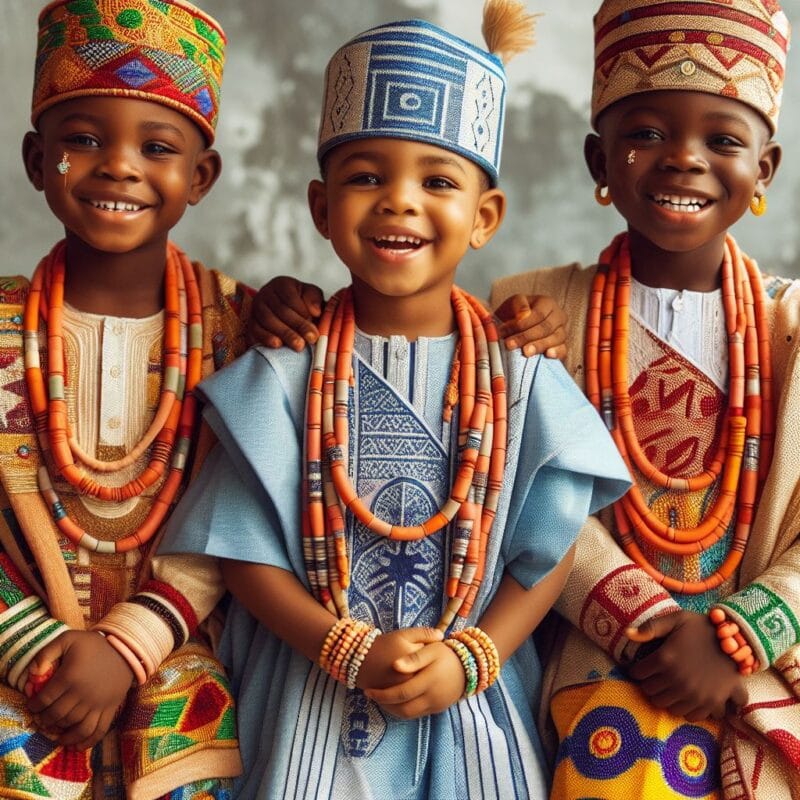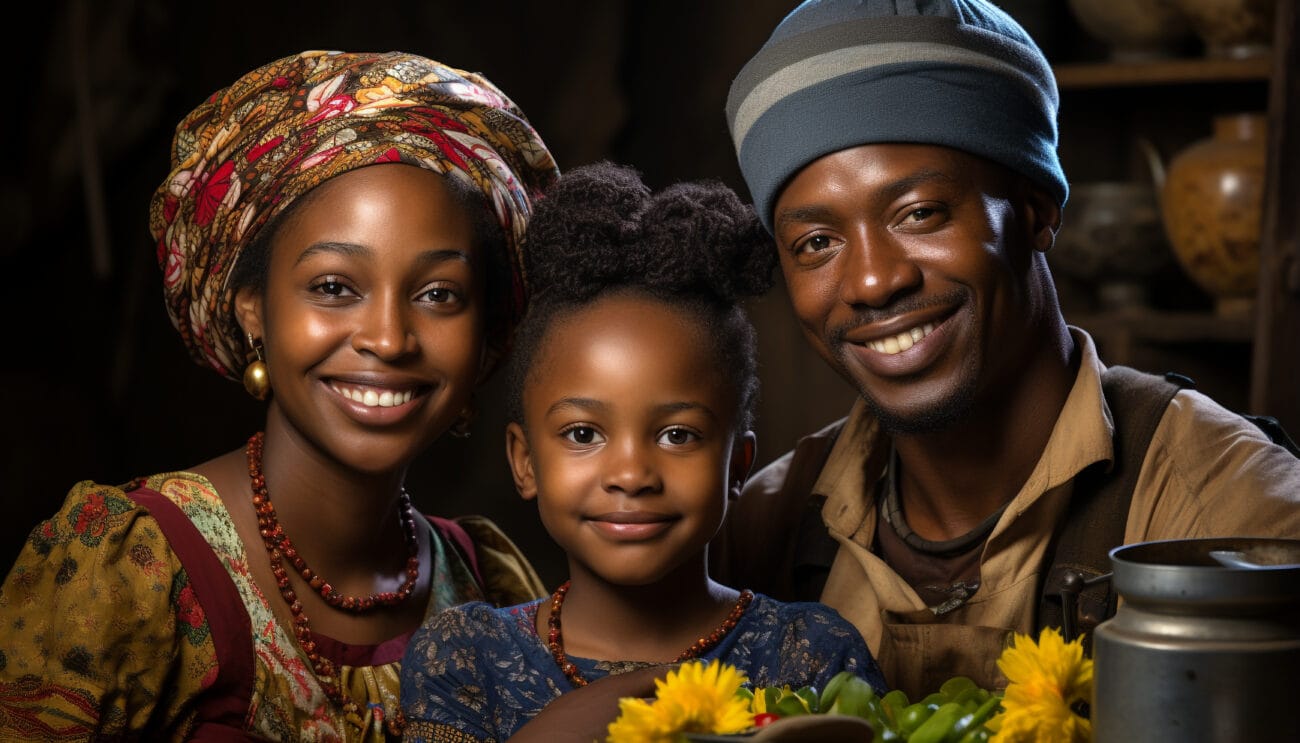How To Get Your Child Connected To Their Nigerian Heritage

As a parent, there is nothing more rewarding than watching your child grow, learn, and explore their identity. For Nigerian parents living outside their homeland, instilling a sense of pride and familiarity in their Nigerian heritage can be particularly important. In a world where children are often immersed in different cultures, you may wonder how to effectively share the rich heritage with your kids. Fortunately, there are enjoyable and engaging ways to make this experience fun and meaningful for them.
Why Cultural Connection Matters
Before diving into some fun ways to share your Nigerian heritage, let’s talk about why this connection is so important. Knowing about their cultural background helps children develop a sense of identity. It gives them roots to hold onto, even when the world around them feels different or overwhelming. When your child knows about their culture, it builds their self-esteem and gratitude for where they come from, as well as an appreciation for diversity.
Picture this: your child in a diverse classroom, sharing stories about family gatherings filled with laughter, holiday celebrations with delicious jollof rice, and the wise sayings that guide your family’s values. That feeling of pride and belonging is what we’re aiming for!
5 Fun Ways To Teach Your Kids About Nigerian Culture And Values
Teaching children about Nigerian culture can take many forms; it doesn’t have to be a serious lecture. Instead, think of it as an adventure to explore! Here are fun ways to help your child learn:

Engage Your Child In Nigerian Language Learning Programs:
Enrol your child in Nigerian language learning Programs and watch them learn at their own pace. With interactive classes and engaging resources like flashcards and worksheets which makes learning fun. This program would help your child discover their Nigerian heritage and culture while developing a strong foundation in their Nigerian language.
Share Nigerian stories with your child:
Every culture has its tales, and Nigerian folklore is rich with them! Use storytelling to introduce your children to traditional Nigerian stories featuring talking animals, clever heroes, and moral lessons. Settle down with a blanket, perhaps under fairy lights, and let the stories transport you both to the vibrant landscapes of Nigeria.
For instance, share tales of The fisherman and the princess fish, The tortoise and elephant (gwo gwo gwo) etc, who taught valuable lessons about contentment, humility and achievements. Ask your kids what they think the story means, and relate it to values such as kindness, respect for others, and the importance of community. This can ignite conversations about their values and culture in a way that feels lively and engaging.
Normalize Cooking Nigerian Dishes:
Children love to help in the kitchen, especially when there’s food involved! Cooking traditional Nigerian dishes together can be both educational and fun. Choose recipes like jollof rice, pounded yam, egusi soup, or chin chin. As you prepare the meal, share anecdotes about family traditions related to food and how it plays a central role in Nigerian festivities.
Explain the significance of certain dishes during celebrations—like how jollof rice is a staple at weddings or holidays. Let your child participate by stirring, measuring, and, of course, tasting! It will create special memories and teach them about their culinary heritage.
Embrace Nigeria Music And Dance
Who can resist the infectious beat of Nigerian music? Play a variety of Nigerian songs and let your child experience the rhythm of Afrobeats, highlife, and traditional folk music. Encourage them to dance, no need for perfection; it’s all about having fun. Tell them about the artists, the genre’s background, or any dances that accompany the music.
You can even throw an impromptu dance party at home! Create a playlist of their favorite songs and have fun learning the dance moves together. This not only introduces them to the vibrant music scene in Nigeria but also helps them appreciate the energy and joy of their culture.
Celebrate Nigerian Holidays
Holidays are the perfect time to immerse your kids in cultural traditions. Whether it’s Christmas, Eid, or Independence Day, create a celebration that reflects Nigerian ways of observing these occasions. Decorate the house with colorful decorations, cook traditional foods, and dress in native attire.
Further, involve your kids in the festivals, help them understand the significance of each holiday. Talk about the cultural practices surrounding them, such as the tradition of giving during Christmas or how communities come together during Eid to celebrate with feasts and prayers.
How To Raise Bilingual Kids: Balancing English With Nigerian Language
Raising bilingual children can be both a gift and a challenge. However, with a little planning, you can nurture fluency in both English and their Nigerian language. Here are some tips to strike that balance:

Consistency Is Key
Treat your child’s bilingual journey as a regular part of your day. Dedicate specific times for Nigerian language practice, like during meals, playtime, or bedtime stories. For example, one day a week could be “Nigerian Language Day,” where you only speak in the native language.
Create a Language-Rich Environment
Your home environment can significantly influence language learning. Surround your child with books, music, and videos in both their native language and English.
Encourage Social Interaction With Other Bilingual Kids
Finding ways for your child to interact with other bilingual children or families that share your culture can do wonders. Organize playdates, cultural events, or community gatherings focused on Nigerian culture. Engaging with peers exposes them to natural language use outside of the home environment.
Bilingual Nigerian Kids: Tips To Overcome Language Learning Challenges
While learning multiple languages can be beneficial, it’s not without hurdles. Here are some common challenges and how to overcome them:
Language Mixing
It’s common for children learning two languages to mix them up. If your child suddenly starts responding in English when you’re speaking in your native language, don’t fret! This is part of the learning process. Gently encourage them to switch back, providing phrases to help them express themselves.
Limited Exposure
Sometimes, especially in foreign countries, children may receive limited exposure to their Nigerian language outside the home. Try to enroll them in Nigerian language classes designed for children. Consider scheduling playdates with other Nigerian families, ensuring your child interacts in their language.
Fear Of Making Mistakes
Encourage a growth mindset in your child: making mistakes is a normal part of learning! Share your experience of fumbling and learning through challenges. Let them know it’s okay to stumble while learning a new language; praising effort rather than perfection can ease fears.
Reluctance To Use Their Language
It’s not uncommon for children to hesitate in speaking their language, especially if they perceive it as “different” from their peers’ languages. Encourage their use at home by establishing a “language zone” , a specific time or location where only the Nigerian language is spoken.
Read more about raising Nigerian bilingual kids here.
Group Learning vs Private Learning: Which Is The Best Language Learning Method For Your Child?
As you consider teaching your children their native language, the approach you take can play a role in their success. Here, we’ll explore the advantages of both group and private learning and how to decide what might work best for your child.

Group Learning
Group learning can provide a fun and supportive environment where children can learn together. Here are some benefits:
- Social Engagement: Children might find it easier to participate and feel motivated by peers learning alongside them. The group dynamic encourages interactive activities that can make learning engaging.
- Collaborative Learning: Through group exercises, kids can share language knowledge and help each other understand. This camaraderie builds language skills organically.
However, one-on-one attention might occasionally be necessary if your child struggles with specific concepts.
Private Learning:
Private lessons can also be beneficial depending on your child’s unique needs:
- Personalized Learning: Private lessons offer customized opportunities to address any challenges your child may face. An instructor can adapt their teaching strategy to suit your child’s learning style.
- Flexible Schedule: Private lessons can work around your family schedule, allowing for a learning pace comfortable to your child.
Finding the Balance
Often, a combination of these approaches can yield the best results. You might consider enrolling your child in group classes or private lessons, in Yoruba, Igbo or Hausa.
Help Your Child Learn Their Nigerian Language With Fun Learning Resources
To help your child connect with their Nigerian heritage, using fun learning tools can make a big difference. Resources like worksheets and flashcards can turn language learning into an enjoyable activity. These tools can help your child practice vocabulary and understand the language better while having fun at the same time. In the next section, we’ll take a closer look at how worksheets and flashcards can make learning Igbo, Yoruba, or Hausa easier and more exciting for your child.
How Worksheets Can Help Your Child Learn Igbo, Yoruba, And Hausa
Worksheets can be a fun and practical tool for supporting your child’s language development. They provide structured and engaging activities to help reinforce the language concepts your child is learning.


Worksheets often include vocabulary exercises, encouraging children to match words with images, fill in the blanks, or practice writing. By regularly using worksheets, your child can build a strong vocabulary base in their Nigerian language.
Get free worksheets at LearnWazobia
How To Help Your Child Practice Nigerian Language With Flashcards
Flashcards are an excellent aid for language practice, allowing children to engage in language learning actively.
Get flashcards that focus on animals, colors, food, or household items.
- Try Memory Games
Test your child’s knowledge using flashcard memory games. Lay the flashcards face down and let them take turns flipping over two cards to find matching pairs. This can help reinforce vocabulary while keeping the activity fun and competitive.
- Encourage Regular Practice
Incorporate flashcard practice into your daily routine. You can dedicate a few minutes every day to go over selected flashcards, ensuring consistent exposure to vocabulary over time.




Simple Ways To Share Nigerian Culture With Your Child Every Day
In addition to specific activities, there are simple ways to incorporate Nigerian culture into your everyday life:
Cook meals, speak Nigerian languages, enroll your kids in Nigerian language classes .
You can also:
- Utilize Cultural Decoration At Home
Decorate your home with African art, traditional fabrics, or family photographs that showcase Nigerian culture. This will create an enriching environment that reflects your heritage.
- Use In Everyday Conversations
Incorporate Nigerian words or phrases into daily conversations. You might say, “Let’s eat rice, in your language. This simple act keeps the language present in your child’s life.
Read more:
- 3 Delicious Nigerian Cuisines To Try At Home
- Afonja: The Kakanfo and fall of Oyo empire
- The Igbo Culture: Interesting Things That Are Almost Forgotten
At LearnWazobia we are committed to supporting you in this journey with resources, classes, and tools designed to make learning Nigerian languages and culture enjoyable for your children. Together, let’s instill a sense of pride in their roots!









[…] Remember, dear parent, that raising an African child in a diaspora requires patience, love, and understanding. By creating a supportive environment and encouraging cultural exploration, you’ll help your child stay connected to their African heritage.Read next: How to Get Your Child Connected To Their Nigerian Heritage. […]
[…] How To Get Your Child Connected To Their Nigerian Heritage […]